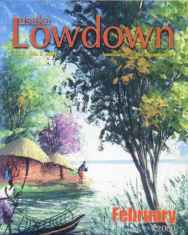 Hunting of wild animals, either by ‘overseas clients’ with a professional hunter or by local people who hunt for enjoyment has always been a subject about which I could not quite make up my mind. Your sympathy immediately lies with the animal that is shot and killed outright, or even worse, the one that is wounded and has to be tracked down as it careers through the bush in pain. But there is more to hunting than that.
Hunting of wild animals, either by ‘overseas clients’ with a professional hunter or by local people who hunt for enjoyment has always been a subject about which I could not quite make up my mind. Your sympathy immediately lies with the animal that is shot and killed outright, or even worse, the one that is wounded and has to be tracked down as it careers through the bush in pain. But there is more to hunting than that.
On the conservation side, and assuming that the hunter is ethical, only old males are hunted or perhaps those animals that are past their prime and have been evicted from the herd. This leaves the females and the younger more virile animals to ensure the continuity of the species. Where certain species have grown to the extent that there is pressure on the environment, hunting or culling, helps to ensure the continued well being of the species.
The benefits of having ‘overseas clients’ extends not only to the foreign exchange that comes into Zambia, but also to the employment of trackers, skinners, cooks and others who assist with the hunting of the animal or run the safari camps. Add to that the camp builders who not only build the camps, but also assist with maintaining the roads and bridges leading to the hunting area, roads which are also vital for the people living in that area.
It also seems that the professional hunters and those who hunt for enjoyment may well be one of the last lines of defence in the prevention of poaching. Their presence in some of Zambia’s remotest areas, where they are accompanied by game scouts, ensure a measure of law enforcement, but with the recently imposed one-year ban on hunting, there will be little or no law enforcement.
Up until two years ago, the management of our wildlife resource was vested in the National Parks and Wildlife Services, a Government Department, with the same problems that other Government Departments have – insufficient funding, insufficient qualified staff, poor salaries…
In an attempt to find a solution to these problems, Government took the bold and pragmatic step and set up the Zambia Wildlife Authority (ZAWA), whose remit was to manage our wildlife resources on a sustainable basis. ZAWA, should have been another example of a public and private sector partnership, working for the good of the country. Funding for the expenses of ZAWA would be from charges levied on fishing, hunting and tourist licences and also, initially, from donors. Once ZAWA was able to stand on its own, any extra funds generated were to be ploughed back into those resources generating the income.
But it seems that the vision of the stakeholders who worked so hard to get ZAWA accepted as the way to go, has been forgotten. Instead we hear stories of hunting areas being allocated to people who didn’t even submit a tender for a hunting area; special licences being issued for the hunting of certain animals although there is a strict quota for each area and each species; areas being allocated to foreign hunting companies who pay no tax in Zambia, whose hunters work in Zambia on a tourist visa and who have no investment in this country. It is not surprising that State House has seen fit to ban hunting for the next twelve months – they will probably need every day of that year to unravel the mess. It seems that there has been abuse of hunting licences, indiscriminate decimation of wildlife and that many of the companies who have been hunting are unable to produce audited accounts of their financial affairs.
The question is whether our wild animals can survive the next year without the vital protection that the professional hunter and game scouts provide. We have also to consider the effect this ban will have on the clients who come here to hunt – most hunters come back year after year, each time to hunt a different animal, but usually with the same professional hunter. If they can’t hunt here this year, will they even bother considering Zambia in the future? Remember also the rural populations who rely on hunting for their livelihood. It is therefore imperative that this ban is lifted immediately, if not totally, then at least partially.
We would suggest that the solution to this problem would be for a limited number of concessions to be allocated to professional hunters resident in Zambia; who have a clean record; who are known to conduct their hunting in an ethical manner; who can supply proof of tax compliance; and who hold a licence issued by the Professional Hunters Association of Zambia. A stop needs to be put to the issuance of special licences and any hunter who has previously obtained such a special licence should automatically be removed from the list of candidates.
We are confident that if serious consultations are held with the professional hunters, a solution can be found that will ensure the continued well being of the Zambian hunting industry.
Leave a Reply
You must be logged in to post a comment.